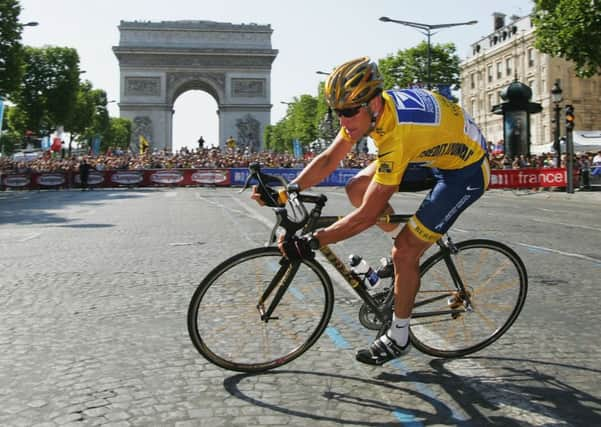Drugs cheat Lance Armstrong joins Tour for charity


Then in 2013 he was gone. Not so much banished as air-brushed out. In between those two Tours there was the publication of the US Anti-Doping Agency’s “reasoned decision” into the industrial doping of Armstrong and his US Postal team. Now it is as though he never existed.
Yet he does still exist. And he is back. Sort of. Armstrong is not riding the Tour. But this week, on Thursday and Friday, he is doing two stages with Geoff Thomas, the former footballer, as part of Thomas’s fund-raising ride for Cure Leukaemia. With a group of friends, Thomas is completing the same route as the Tour 24 hours ahead of the race and Armstrong, a fellow cancer survivor, is a friend.
Advertisement
Hide AdAdvertisement
Hide Ad“Someone will lamp him,” predicted one colleague this week of the reception that awaits Armstrong in France. Doubtless there will be crowds, drawn by Armstrong’s celebrity if nothing else, but they will be dwarfed by those in the Pyrenees on the same days, which is where the actual Tour will be – as much as 278km, and always more than 100km away.
Naturally, “Armstrong returns to the Tour” is an irresistible headline. When it was announced that Armstrong would join Thomas on his charity ride the story generated much media interest (particularly in Britain; in America they don’t seem to care much any more), and then was given legs by UCI president Brian Cookson’s stated opposition. That was perhaps a mistake on Cookson’s part. Not that he should necessarily support the idea. But given that there is nothing he can do to stop Armstrong riding a charity event in France, it seemed like a needless fight to pick. Armstrong had a point when he said last month that “I do know that me and Geoff riding in France is the least of [Cookson’s] problems”.
The two stages Armstrong has selected are in one of the most remote parts of France, in the south-west, where the route begins to head across from the Pyrenees to the Alps. They are difficult, undulating stages – often referred to as “transitional” – but not mountainous. They are as low key as it is likely to get. (The timing of Armstrong’s visit has also been dictated by the fact that he is due back in the US for the latest round of depositions in the $100m whistleblower case brought against him by Floyd Landis and the US Justice Department.)
When he was visited in Colorado by British journalists last month, Armstrong told them: “I could be wrong, but I’ve been to France since all this happened and that’s not the reaction I get. I don’t know if certain people might be concerned that, God forbid, the reaction is positive. What happens then?”
What, indeed. Beyond official disapproval, what reception awaits Armstrong on the roadside, among the fans? “I really have no idea,” says Francois Thomazeau, a French journalist and novelist who has covered the Tour since 1986. “He was never very popular in France anyway.”
So the country will offer a collective Gallic shrug of indifference? “My impression is that France has turned the page on Lance Armstrong,” says Thomazeau – with a shrug. “There was suspicion from the start that he was on dope, and there’s always been a bit of anti-Americanism in France. When the case finally broke and it turned out he was on drugs there was a little bit of satisfaction. It was a little bit like when France was the only one at the United Nations to be against the war in Iraq. We knew better.”
But French antipathy towards Armstrong didn’t all stem from the suspicion that he was a cheat, Thomazeau adds. “No, the reason why French people hated Armstrong was more because he was a winner. I’m afraid France doesn’t like winners much. Deep down in our psyche there’s love for swashbuckling panache, for French flair, rather than efficiency. [Miguel] Indurain was not very liked, even [Bernard] Hinault [a Frenchman] wasn’t liked, nor was [Jacques] Anquetil. The most popular French cyclist of all time is Raymond Poulidor, who never won the Tour. We like sport to remain unpredictable and poetic.
“Now that Armstrong isn’t riding any more, or telling us how to live, we don’t care,” Thomazea adds. “There might even be some respect now. France is a forgiving society; we’re a Catholic country.
“And the guy has lots of qualities: personality, charisma, intelligence. He’s not just a bastard. The dark side only makes him even more fascinating.”